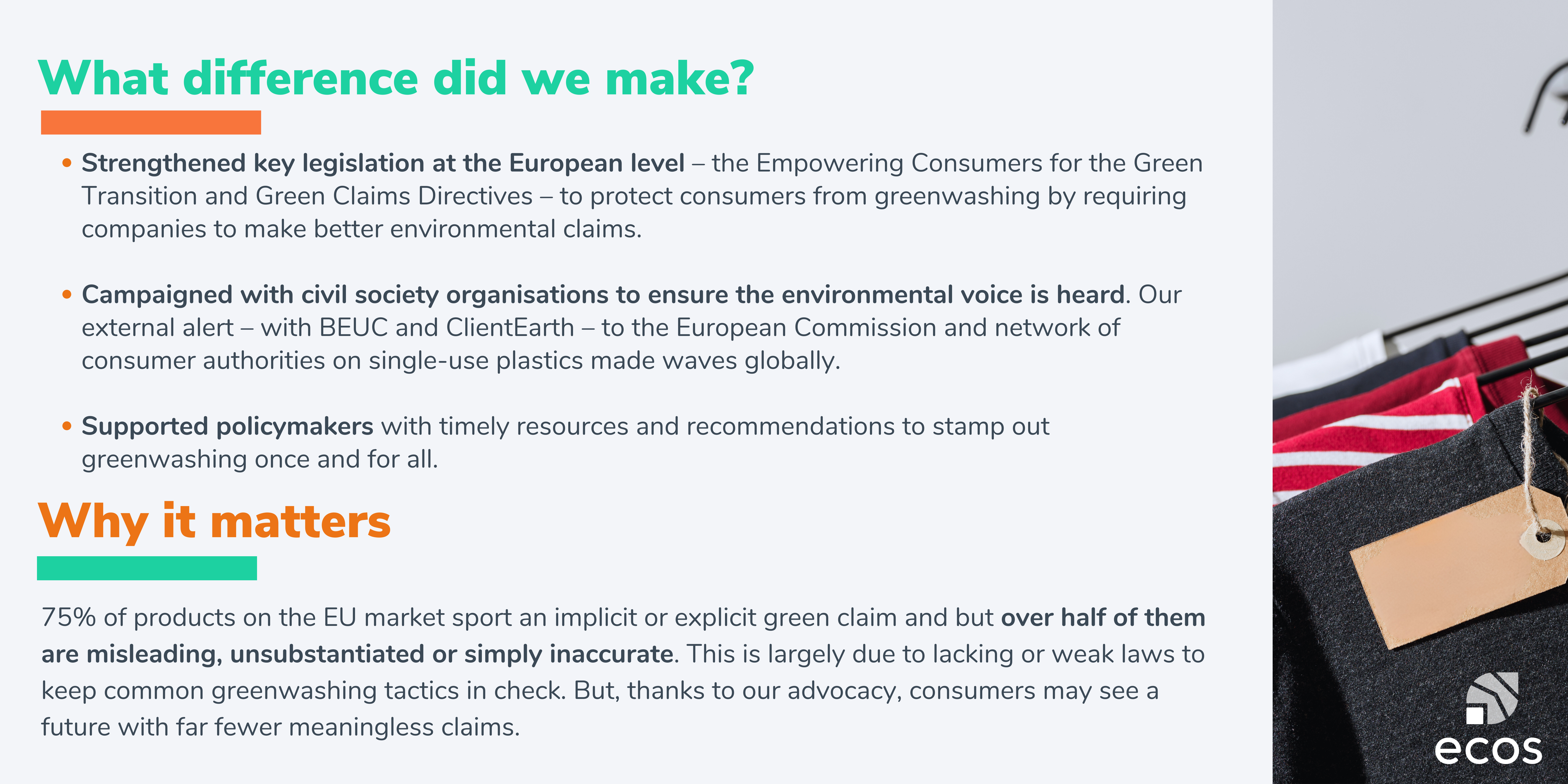Initiating the beginning of the end for greenwashing?
Consumers increasingly want to reduce their environmental impact by choosing the least environmentally damaging products. However, they face a barrage of inaccurate and unverifiable claims – otherwise known as greenwashing. From climate neutral flights to bananas, showcasing a product’s environmental friendliness – regardless of how reliable the information really is – has become a dubious marketing strategy. But thanks to our efforts in 2023, we could soon see an end to this wild west of green claims. No more dubious ‘planet friendly’ or ‘100% green’ slogans presented alone on a billboard.

The wild west of green claims
The numbers are clear: more than half of environmental claims made by businesses are misleading, unsubstantiated, or simply inaccurate. This is because rules set in legislation and standards are loose, leaving the door wide open to greenwashing.
The lack of clarity in legislation also means regulators bear the brunt of the burden – verifying the vast amount of claims is next to impossible, and even if it happens, the damage has already been done.
There is a great need for regulating green labels – but such legislation must be built on strong methods and data to be made watertight against false environmental claims, and expecting policymakers to have this detailed insight is a tall order. This is why, throughout 2023, ECOS worked relentlessly, contributing our expertise in technical policies and standards to ensure ambitious results, which work for the planet, and consumers.
Strengthening key legislations to usher in a new era for consumer rights
2023 saw the roll-out of two key pieces of EU legislation – the Empowering Consumers for the Green Transition (ECGT) and the Green Claims Directives.
The ECGT in particular has progressively become stronger because of our unique expertise guiding the processes from start to finish. It has now been approved by the European Parliament, finally bans common greenwashing tactics. That means zero tolerance for claims based on credits to offset carbon emissions, future environmental performance with no realistic plan, and claims based on zero evidence.
Without ECOS, banning claims based on carbon offsetting credits could have been missed entirely. The first – and by far most significant – action companies must take to limit their impact on the climate is to reduce their emissions. This cannot be avoided, and claims based on carbon offsetting are a trick to hide climate inaction.
However, gaps remain if the EU is serious about stamping out greenwashing once and for all. The Green Claims Directive – expected to provide common rules for effectively communicating about the environmental credentials of products – could fill them. And ECOS will continue working with policymakers and other partners to ensure it does.
Out-of-control environmental claims can no longer be ignored
Our actions in 2023 also brought important visibility to expose out-of-control environmental claims.
In October, together with ClientEarth and BEUC (the European Consumer Organisation), we took aim at one of the greenwashing’s biggest offenders: plastic. Following months of preparation, our external alert to the European Commission and the European network of consumer authorities (CPC-Network) reported companies using misleading claims on single-use plastic beverage bottles labelled as ‘100% recyclable’ or ‘made of 100% recycled plastic’. Our alert, complemented with an evidence-based report, quickly gained traction reaching key global media and resulting in hundreds of articles across Europe and beyond.
Our June conference, ‘Too net-zero to be true?’ also put greenwashing under the spotlight. The event, well attended by key actors from civil society, EU institutions, and standardisation bodies, focused on how environmental information should (and should not) be communicated to be reliable and transparent. This is a flagship example of how ECOS brings together key stakeholders from civil society and industry on issues that often fly under the climate-action radar.
Towards complete corporate accountability
In 2024, we will continue working towards more stringent laws and standards to guarantee truly green environmental claims. With the right framework in place, companies producing more sustainable products will finally receive the attention and market share they deserve, while polluting companies will no longer be able to advertise their products as green. This is key to ensure all stakeholders, including consumers, can play their part in protecting our planet, and future.


